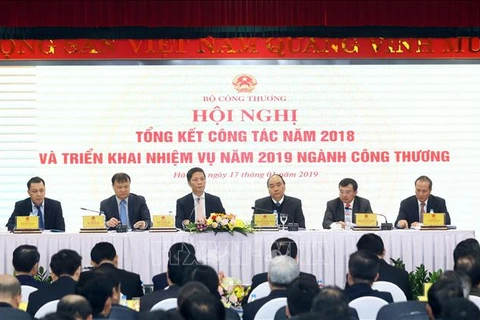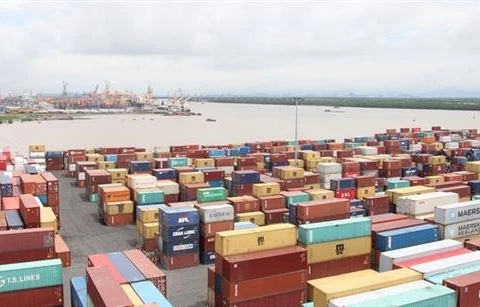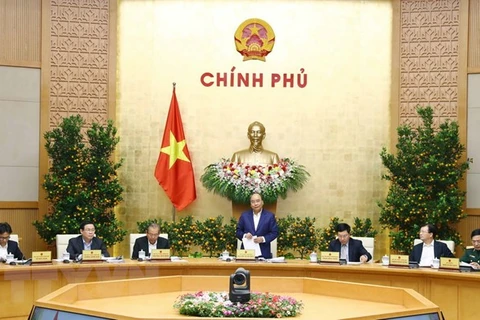 The trade deficit will be a big challenge for the economy this year due to tax incentives that lower the price of imported goods on the Vietnamese market. (Photo: cafef.vn)
The trade deficit will be a big challenge for the economy this year due to tax incentives that lower the price of imported goods on the Vietnamese market. (Photo: cafef.vn) Hanoi (VNS/VNA) - The trade deficit will be a big challenge to the economy this year due to tax incentives that lower the price of imported goods on the Vietnamese market.
According to preliminary statistics of the General Department of Customs published recently, the nation’s export turnover reached 20 billion USD in the first month of this year, down 1.3 percent year-on-year, while imports reached nearly 20.8 billion USD, an increase of 3.1 percent.
The trade deficit occurred because, at the same time as export turnover was down from the same period last year, demand for imported goods increased in both quantity and value ahead of the Lunar New Year.
These figures agree with the forecast released a few days ago by the Ministry of Industry and Trade (MoIT), which said the trade surplus will not be maintained this year due to many visible difficulties. Instead of continuing the record-breaking trade surplus seen in 2017 and 2018, the country’s exports may reverse.
Export turnover in 2019 is expected to reach about 265 billion USD, up by 8-10 percent from 2018. The import is about 268 billion USD, up by 11.7 percent. Trade deficit is estimated at 3 billion USD.
In January, the export value of many key products sharply reduced. Exports of phones and devices were down 27.5 percent to 2.9 billion USD, and electronics and computers decreased by 5 percent to 2.3 billion USD. Meanwhile, import value increased for machines, equipment, parts and tools, which were up 3.8 percent to 3 billion USD.
According to the MoIT’s assessment, import demand this year will increase because exports are expected to continue growing in sectors where Vietnam still depends on import materials, machines, equipment and spare parts.
This year, the implementation of FTAs and major agreements such as the Comprehensive and Progressive Agreement for Trans-Pacific Partnership (CPTPP) and the European Union − Vietnam Free Trade Agreement (EVFTA) will create a new wave of investment in Vietnam by domestic and foreign businesses looking to take advantage of new opportunities. Therefore, imports of machinery and equipment for projects and purchases of materials for production will increase. This will lead to a reversal of the trade balance from a surplus to a deficit.
Minister of Agriculture and Rural Development Nguyen Xuan Cuong said that 2018 was a fruitful year for both the industry and agriculture sectors. The year saw a record 245 billion USD in export value in the context of declining exports worldwide.
Cuong said with the shifting production structure of the economy, the 2018 surplus of 7.2 billion USD was a very big number for Vietnam’s economy. However, the forecast for 2019 indicated it will be a very difficult year.
Managing Director of the Vietnam National Garment and Textile Group (Vinatex) Cao Huu Hieu told Tien Phong (Vanguard) Newspaper that the growth of the textile and garment industry would be unpredictable in 2019.
“With the trade war, if there is a 15 per cent tax increase, the competition on the market will be very fierce,” Hieu said.
In the face of this situation, Vinatex has to adjust its targets to a growth rate of 8-9 percent.
"The target for export revenue is about 40 billion USD,” Hieu said. “We also have to look directly at things that cannot grow forever. We must accept there are years without growth. India and Bangladesh having negative growth in 2018 are lessons for us. In 2019, Vinatex will not expand investment but is focused on intensive investment, replacing machines according to periodic plans.”
Speaking about export challenges at a recent conference on implementing the 2019 mission, Prime Minister Nguyen Xuan Phuc said that if the MoIT did not institute a breakthrough policy for industrialisation and attract more capital from multinational corporations in various fields, Vietnam’s economy would face a lot of difficulties this year.-VNS/VNA
VNA























